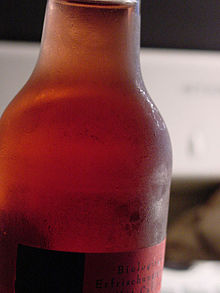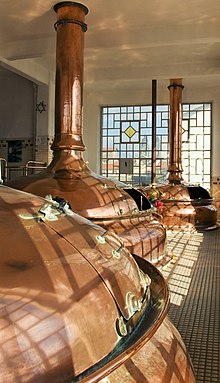Beverage technology
The beverage industry is a technical scientific discipline and specialized field of food technology and process engineering . It deals with the production processes of beverages as well as the material processes of a biotechnological , physical , chemical and biological nature in the overall process of processing and marketing on the basis of scientific , technical, economic , ecological and social principles.
The goal is the best use of usually agricultural or horticultural produced raw materials for their processing into beverages with high quality standards based on technological development, including all boundary conditions.
history
The oldest applications of beverage technology have been known for 5,000 years: the production of wine or beer with the help of yeasts ( alcoholic fermentation ) and later their refinement into spirits by distillation . While the original products were largely coincidental and their production has been passed down within the family, the monasteries of the Middle Ages were the researchers for both winemaking and brewing with a systematic approach and knowledge transfer outside the family.
The commercial production of non-alcoholic beverages is much more recent. It begins with the production and distribution of mineral water through the production of sweet musts , lemonades and showers , the so-called soft drinks , to newer products such as mixed wine and beer drinks and organic drinks .
Production methods
Beverage technology uses knowledge from biochemistry , microbiology and process engineering to manufacture its products. In the course of the development of new production methods, various techniques are dealt with that were previously only known in biochemical or microbiological research. The organisms used can first be analyzed and sometimes modified in such a way that they better meet the requirements on a large scale. The following processes are used in beverage production:
- Mechanical processes such as crushing, mashing , pressing and mixing
- Thermal processes, for example heating and cooling
- Biological processes such as alcoholic fermentation and the use of bacteria and fungi
- Chemical processes, for example the coagulation of proteins
- Physical processes, for example crystallization for tartar separation and rectification in the production of rectified grape must concentrate
Bioreactors
For the production of beer, wine and sparkling wine , the prepared substrates are cultivated with natural or added microorganisms in fermenters or bottles , in which the exact conditions prevail under which the organisms produce the desired substances. However, these do not necessarily have to be the conditions in which the organism thrives best. The conversion of the substance can be controlled by various parameters, such as temperature or stirrer settings , sugar content or the addition of starter cultures such as pure yeast or lactic acid bacteria ( malolactic fermentation ).
Organisms
Both bacteria and fungi are used in modern beverage technology. Frequently used organisms have often already been carefully researched, such as the bacterium Oenococcus oeni or sugar yeasts such as Saccharomyces cerevisiae . The use of genetically modified organisms is still limited to the research area.
education and study


Since the 1970s, beverage technology has been offered as an independent course of study in the Federal Republic of Germany. Until 2005 were in the diploma course , depending on the university , the financial statements Ing. ( University of Applied Sciences Wiesbaden - Geisenheim department , since 2013 independent University of Geisenheim ) since then the degrees B. Sc. in Bachelor and M. Sc. can be obtained in the Master’s course . The course is offered at the following universities in Germany:
- Technical University Berlin
- Weihenstephan-Triesdorf University of Applied Sciences
- Geisenheim University
- Justus-Liebig university of Giessen
- Technical University of Munich
- Technical University of Ostwestfalen-Lippe
The study of beverage technology has an interdisciplinary structure and is based on various classical natural sciences, engineering and economics that lead to scientific ways of thinking and working and methods of gaining knowledge. Various specific subjects lead to specialization and consolidation. The degree of involvement of the various disciplines varies depending on the university.
Natural Sciences:
- Chemistry: biochemistry, physical chemistry
- physics
- Biology: botany , microbiology
- mathematics
Engineering:
- Engineering : Design and installation of bottle fillers land , steam boiler plants , measuring -, control - and control engineering ,
- Process engineering : pumps + compressors , refrigeration technology , conveyor technology , dispersion , emulsion , sterilization
Economics:
- Marketing : marketing management
- Business administration : corporate management , financing , taxation
- Economics
Specific subjects:
- Brewery technology : fermentation technology , malting technology , brewhouse technology
- Distillery technology
- Sensor technology (food testing ) : organoleptics
- Nutritional physiology
- Food and Wine Law
- Cleaning and disinfection
- Osh
- Fruit and vegetable technology or technology of foods of vegetable origin
- Sugar technology
- Beverage chemistry / beverage analysis
- Quality management
literature
Books
- Gerhard Troost : Technology of Wine . 6th edition. Eugen Ulmer, Stuttgart 1988, ISBN 3-8001-5816-7 .
- Gerhard Troost, Hans Peter Bach, Otto H. Rhein: Sekt, sparkling wine, sparkling wine . 2nd Edition. Eugen Ulmer, Stuttgart 1995, ISBN 3-8001-5818-3 .
- Helmut Hans Dittrich: microbiology of wine . Eugen Ulmer, Stuttgart 1977, ISBN 3-8001-5807-8 .
- Heinrich Kreipe: Grain and potato distillery . 3. Edition. Eugen Ulmer, Stuttgart 1981, ISBN 3-8001-5810-8 .
- Ulrich Schobinger: Fruit and vegetable juices . 1st edition. Eugen Ulmer, Stuttgart 1978, ISBN 3-8001-5821-3 .
- Hans Joachim Pieper, Ernst-Erich Bruchmann, Erich Kolb: Technology of the fruit distillery . 1st edition. Eugen Ulmer, Stuttgart 1977, ISBN 3-8001-5814-0 .
- Ludwig Narcissus : demolition of the brewery . 4th edition. Enke, Stuttgart 1980, ISBN 3-527-30860-1 .
- Heinz-Gerhard Kessler: Food process engineering - dairy technology . 4th edition. A. Kessler, 1996, ISBN 3-9802378-4-2 .
- Südzucker : The Südzucker Handbook - Non-Alcoholic Soft Drinks. 2nd and 3rd edition. 1980.
- Ludw. Flöttmann: Guidelines for medicinal spring protection areas . Published on behalf of the state working group on water. Gütersloh 1966.
- Deutscher Bäderverband eV: Definitions for health resorts, recreational areas and healing fountains . 1972.
- Hugo Schanderl , Julius Koch , Erich Kolb: fruit wines . Ulmer, Stuttgart 1981, ISBN 3-8001-5518-4 .
- H. Tanner, HR Brunner: Beverage Analysis . Heller, Schwäbisch Hall 1979.
- Peter Hahn, Gisela Semmler: BBV Report Non-Alcoholic Drinks . Behr, Hamburg 1982, ISBN 3-922528-24-4 .
Trade journals
- Brewing world . Fachverlag Hans Carl.
- LIQUID FRUIT. confructa medien GmbH.
- BEVERAGES! Technology & Marketing. Armor.
- Beverage industry and brewing industry. Sachon.
- VDI news. Association of German Engineers .
Individual evidence
- ↑ The most popular fruit juices in Germany. Association of the German Fruit Juice Industry , accessed on September 23, 2018 .





